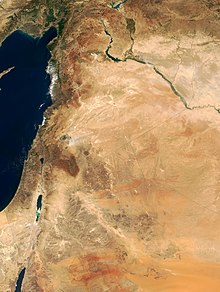Syrian Wars
- For the wars between Rome and Antiochus III, see Roman war against Antiochus III

The Syrian Wars were a series of six wars between the Seleucid Empire and the Ptolemaic Kingdom during the 3rd and 2nd centuries BC over the region of Coele-Syria, one of the few avenues into Egypt. These conflicts drained the strength of both parties involved and led to their eventual destruction at the hands of Rome and Parthia.
A decade into his rule, Ptolemy II faced Antiochus I, the Seleucid king who was trying to expand his empire's holdings in Syria and Anatolia. Ptolemy proved to be a forceful ruler and skilled general. In addition, his recent marriage to his court-wise sister Arsinoë had stabilized the volatile Egyptian court, allowing Ptolemy to successfully carry out the campaign. Some feminist interpretations of history even claim that it was Arsinoe's brains and talent which won the war.
The First Syrian War was a major victory for the Ptolemies. Antiochus took the Ptolemaic controlled areas in coastal Syria and southern Anatolia in his initial rush. Ptolemy reconquered these territories by 271 BC, extending Ptolemaic rule as far as Caria and into most of Cilicia. With Ptolemy's eye focused eastward, his half-brother Magas declared his province of Cyrenaica to be independent. It would remain independent until 250 BC, when it was reabsorbed into the Ptolemaic Kingdom.
Antiochus II succeeded his father in 261 BC, and thus began a new war for Syria. He reached an agreement with the current Antigonid king in Macedon, Antigonus Gonatas, who were also interested in pushing Ptolemy II out of the Aegean. With Macedon's support, Antiochus II launched an attack on Ptolemaic outposts in Asia.
Most of the information about the Second Syrian War has been lost. It is clear that Antigonus' fleet defeated Ptolemy's at the Battle of Cos in 256, diminishing Ptolemaic naval power. Ptolemy appears to have lost ground in Cilicia, Pamphylia, and Ionia, while Antiochus regained Miletus and Ephesus. Macedon's involvement in the war ceased when Antigonus became preoccupied by the rebellion of Corinth and Chalcis in 253 BC, possibly instigated by Ptolemy, as well as an increase in enemy activity along Macedon's northern frontier.
The war was concluded around 253 BC with the marriage of Antiochus to Ptolemy's daughter, Berenice Syra. Antiochus repudiated his previous wife, Laodice, and turned over substantial domain to her. He died in Ephesus in 246, poisoned by Laodice according to some sources. Ptolemy II died in the same year.
Also known as the Laodicean War, the Third Syrian War began with one of the many succession crisis that plagued the Hellenistic states. Antiochus II left two ambitious mothers, his repudiated wife Laodice and Ptolemy II's daughter Berenice Syra, in a competition to put their respective sons on the throne. Laodice claimed that Antiochus had named her son heir while on his deathbed, but Berenice argued that her newly born son was the legitimate heir. Berenice asked her brother Ptolemy III, the new Ptolemaic king, to come to Antioch and help place her son on the throne. When Ptolemy arrived, Berenice and her child had been assassinated.
Ptolemy declared war on Laodice's newly crowned son, Seleucus II, in 246 BC, and campaigned with great success. He won major victories over Seleucus in Syria and Anatolia and briefly occupied Antioch. Seleucus had his own difficulties. His domineering mother asked him to grant co-regency to his younger brother, Antiochus Hierax, as well as rule over Seleucid territories in Anatolia. Antiochus promptly declared independence, undermining Seleucus' efforts to defend against Ptolemy.
In exchange for a peace in 241, Ptolemy was awarded new territories on the northern coast of Syria, including Seleucia Pieria, the port of Antioch. The Ptolemaic kingdom was at the height of its power.
Effects of the Syrian Wars
See also
Sources and further reading
Green, Peter. Alexander to Actium: The Historical Evolution of the Hellenistic Age. Berkeley: University of California Press, 1990.
